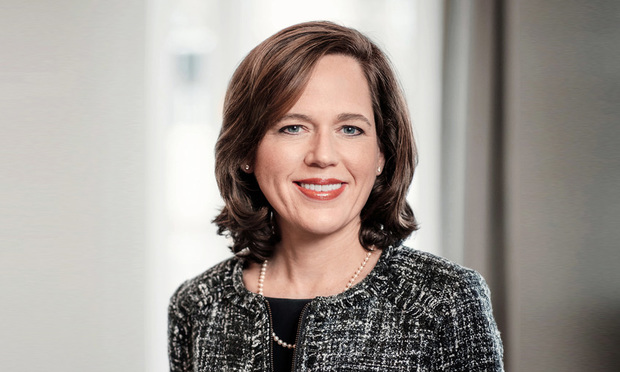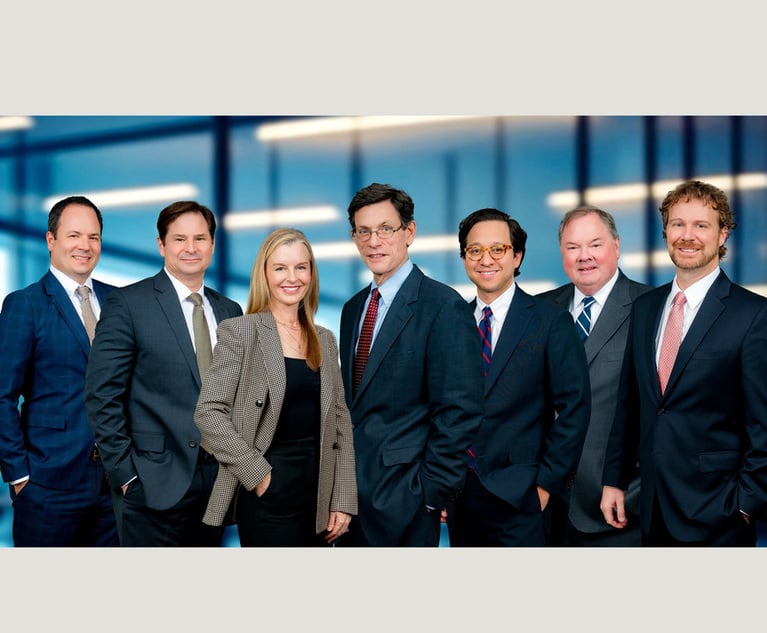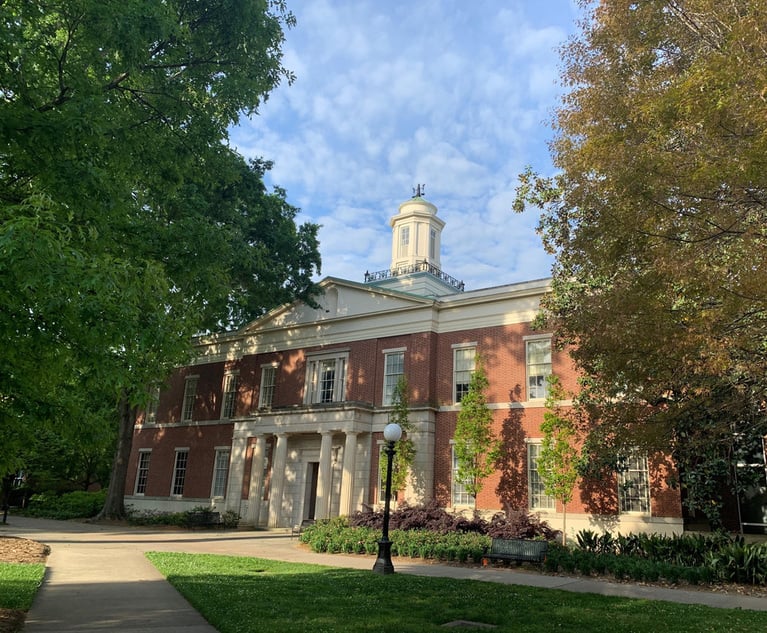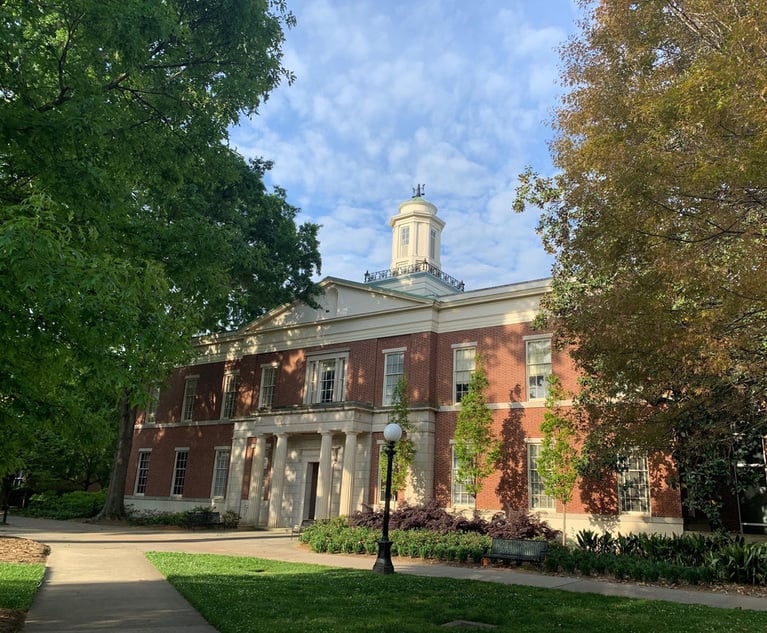Midsize Firm Q&A: Melody Eagan of Lightfoot, Franklin & White
"As a midsize litigation boutique firm, Lightfoot has the flexibility to offer our clients any number of value-based fee arrangements. The only limit is the creativity of our lawyers and clients."
September 26, 2019 at 10:00 AM
7 minute read
 Melody H. Eagan, managing partner with Lightfoot, Franklin & White (Courtesy photo)
Melody H. Eagan, managing partner with Lightfoot, Franklin & White (Courtesy photo)
This interview is part of a series of conversations with leaders of midsize law firms in the region. These are firms with 50 to 199 lawyers that often tackle challenges distinct from those facing boutiques and Big Law.
Melody Eagan is managing partner of 61-lawyer Lightfoot, Franklin & White, which maintains offices in Birmingham, Alabama, and Houston, Texas. She took the role at the beginning of 2018, becoming the first woman leader in the firm's history.
When she isn't managing the firm, she defends clients in high-stakes catastrophic injury and wrongful death cases, in product liability and medical malpractice matters. She also serves as appellate counsel. She graduated from Hendrix College in 1991 and Vanderbilt University Law School in 1994.
Eagan answered the following questions from the Daily Report.
What are the firm's practice areas?
Antitrust, Appellate, Arbitration & Mediation Services, Automotive, Aviation & Aerospace, Banking & Financial Services, Catastrophic Injury, Class Actions, Commercial Litigation, Commercial Transportation, Construction, Consumer Fraud & Bad Faith, Corporate Recoveries, Directors' & Officers' Liability, Employment Law, Energy Litigation, Environmental & Toxic Torts, FINRA Securities Arbitration, Fire & Explosion, Healthcare, Intellectual Property, International Disputes, Life Sciences, Media & Communications Law, Medical Malpractice, NCAA Compliance & Investigations, Product Liability, Professional Liability, Securities & Shareholder Disputes, Software & Technology, Trade Secrets & Unfair Competition, Trust & Estate Disputes, White Collar Criminal Defense & Corporate Investigations.
What is the firm's governance structure and compensation model?
Lightfoot is an LLC with members who collectively own the firm. We are governed by an executive committee comprised of four partners plus the managing partner. Lightfoot's compensation model does not include originating attorney credits. Rather, it is a modified lockstep model that compensates partners based upon seniority and overall contribution to the firm.
Do you offer alternative fee arrangements?
Yes. As a midsize litigation boutique firm, Lightfoot has the flexibility to offer our clients any number of value-based fee arrangements. The only limit is the creativity of our lawyers and clients. We are always willing to explore billing arrangements outside of the traditional billable hour. We have found that, when there is "skin in the game" on both sides with an arrangement based on both experience and data, the end result is a relationship designed to deliver value. Our value-based fee arrangements have varied from the more traditional (flat fee by phases, blended rates, success fees, holdbacks) to the more creative based upon a specific client's needs.
What do you view as the two biggest opportunities for your firm, and what are the two biggest threats?
We represent clients across the United States and recently expanded into the Houston market. Servicing our clients who have legal matters in Texas and the Southwest is an exciting opportunity for us, and we look forward to growing that office.
Diversity and inclusion is a hot topic in the legal profession, and two years ago I was elected as Lightfoot's first female managing partner. We have a number of diverse lawyers serving in firm leadership roles, including the recent selection of one of our female partners as Lightfoot's hiring partner. We also have a diversity committee focused on recruiting and retention of minority attorneys and staff, as well as providing an inclusive work environment. Lightfoot's emphasis on diversity sets a positive example for our younger lawyers and for the business community. It allows us to better serve our clients—people from different backgrounds bring new thoughts to the table and foster fresh, creative solutions to our clients' challenges.
A threat faced by many firms our size is the increasing encroachment of larger national firms on midsize markets. We're all going after the same clients, whereas 15 years ago that was not the case. While it's a threat, it's also an opportunity to deliver better client service to set ourselves apart.
For litigation firms such as ours, the disappearing jury trial is also a concern. Fewer and fewer cases are going to trial, which also makes it more difficult for young litigators to hone their skills. We are addressing this by giving our associates prominent roles in every trial we handle and involving them more in arbitrations. We also promote pro bono work, where associates can serve our community while benefiting from the related trial experience opportunities.
The legal market is so competitive now—what trends do you see, and has anything, including alternative service providers, altered your approach? Is your chief competition other midmarket firms or is your firm competing against big firms for the same work?
Clients continue to consolidate the number of firms they use and are moving toward a regional model. While our primary source of business used to be referrals, we have increased our participation in RFPs from clients seeking regional counsel.
We have not seen many alternative service providers impact our business to date.
Our main competition is probably other midmarket firms, but, as our national practice grows, we are competing more and more against large, national firms.
There is much debate around how law firms can foster the next generation of legal talent. What advantages and disadvantages do midsize firms have in attracting and retaining young lawyers, particularly millennials?
Lightfoot is a young firm with only a handful of attorneys over the age of 60. We do not have rigid practice groups, and associates are not assigned to work with one or two partners. Instead, the firm's founding members created an environment where cases are staffed based on which lawyers make the best team for that matter (including considerations like diversity and experience), rather than whose client is whose.
This structure encourages collaboration among our lawyers to provide the best service and outcomes for our clients. It is not uncommon for a junior lawyer on a matter to have as much or more interaction with a client than the partner. We work hard to provide our younger lawyers opportunities to learn by doing, which gives them the experience they need to grow in their practice. All of this is advantageous in attracting and retaining young lawyers. The ability to work off-site and have a flexible schedule is also important to millennials, so we utilize technology to make that a reality.
Does your firm employ any nonlawyer professionals in high-level positions (e.g., COO, business development officer, chief strategy officer, etc.)? If so, why is it advantageous to have a nonlawyer in that role? If not, have you considered hiring any?
We have nonlawyers serving as chief operating officer/chief information officer, chief financial officer and director of business development and marketing. We have found it advantageous to have nonlawyers who are more specialized in their unique area of responsibility (e.g., marketing, financial analysis, personnel management, etc.) who bring skilled experience and often diverse perspectives to the table.
What would you say is the most innovative thing your firm has done recently, whether it be technology advancements, internal operations, how you work with clients, etc.?
We have developed an intranet-based case management tool that enables us to manage and track our matters at a glance. Our cloud-based document management and time-entry systems also allow our attorneys to practice seamlessly, wherever they are.
Does your firm have a succession plan in place? If so, what challenges do you face in trying to execute that plan? If you don't currently have a plan, is it an issue your firm is thinking about?
Yes. At Lightfoot, junior partners and even associates often have as much interaction with a client as the more senior partner. This approach benefits not only the younger lawyer but also the client, since succession planning becomes woven into the fabric of daily interactions. A core value at Lightfoot is that our clients are firm clients, not an individual lawyer's client. This is fostered, in large part, by our rejection of origination as a basis for partner compensation. As partners age, we make sure that there is a team in place for each client with whom the client is comfortable, to ensure a seamless transition.
This content has been archived. It is available through our partners, LexisNexis® and Bloomberg Law.
To view this content, please continue to their sites.
Not a Lexis Subscriber?
Subscribe Now
Not a Bloomberg Law Subscriber?
Subscribe Now
NOT FOR REPRINT
© 2025 ALM Global, LLC, All Rights Reserved. Request academic re-use from www.copyright.com. All other uses, submit a request to [email protected]. For more information visit Asset & Logo Licensing.
You Might Like
View All

Georgia Justices Urged to Revive Malpractice Suit Against Retired Barnes & Thornburg Atty
4 minute read

28 Firms Supporting Retired Barnes & Thornburg Litigator in Georgia Supreme Court Malpractice Case
7 minute readTrending Stories
- 1NY No-Fault Insurance Adopts Worker’s Compensation Fee Schedule
- 2With AI Expected to Be a Focus This Year, What Changes Can Midsize Firms Expect?
- 3Dissenter Blasts 4th Circuit Majority Decision Upholding Meta's Section 230 Defense
- 4NBA Players Association Finds Its New GC in Warriors Front Office
- 5DC Circuit Keeps Docs in Judge Newman's Misconduct Proceedings Sealed
Who Got The Work
J. Brugh Lower of Gibbons has entered an appearance for industrial equipment supplier Devco Corporation in a pending trademark infringement lawsuit. The suit, accusing the defendant of selling knock-off Graco products, was filed Dec. 18 in New Jersey District Court by Rivkin Radler on behalf of Graco Inc. and Graco Minnesota. The case, assigned to U.S. District Judge Zahid N. Quraishi, is 3:24-cv-11294, Graco Inc. et al v. Devco Corporation.
Who Got The Work
Rebecca Maller-Stein and Kent A. Yalowitz of Arnold & Porter Kaye Scholer have entered their appearances for Hanaco Venture Capital and its executives, Lior Prosor and David Frankel, in a pending securities lawsuit. The action, filed on Dec. 24 in New York Southern District Court by Zell, Aron & Co. on behalf of Goldeneye Advisors, accuses the defendants of negligently and fraudulently managing the plaintiff's $1 million investment. The case, assigned to U.S. District Judge Vernon S. Broderick, is 1:24-cv-09918, Goldeneye Advisors, LLC v. Hanaco Venture Capital, Ltd. et al.
Who Got The Work
Attorneys from A&O Shearman has stepped in as defense counsel for Toronto-Dominion Bank and other defendants in a pending securities class action. The suit, filed Dec. 11 in New York Southern District Court by Bleichmar Fonti & Auld, accuses the defendants of concealing the bank's 'pervasive' deficiencies in regards to its compliance with the Bank Secrecy Act and the quality of its anti-money laundering controls. The case, assigned to U.S. District Judge Arun Subramanian, is 1:24-cv-09445, Gonzalez v. The Toronto-Dominion Bank et al.
Who Got The Work
Crown Castle International, a Pennsylvania company providing shared communications infrastructure, has turned to Luke D. Wolf of Gordon Rees Scully Mansukhani to fend off a pending breach-of-contract lawsuit. The court action, filed Nov. 25 in Michigan Eastern District Court by Hooper Hathaway PC on behalf of The Town Residences LLC, accuses Crown Castle of failing to transfer approximately $30,000 in utility payments from T-Mobile in breach of a roof-top lease and assignment agreement. The case, assigned to U.S. District Judge Susan K. Declercq, is 2:24-cv-13131, The Town Residences LLC v. T-Mobile US, Inc. et al.
Who Got The Work
Wilfred P. Coronato and Daniel M. Schwartz of McCarter & English have stepped in as defense counsel to Electrolux Home Products Inc. in a pending product liability lawsuit. The court action, filed Nov. 26 in New York Eastern District Court by Poulos Lopiccolo PC and Nagel Rice LLP on behalf of David Stern, alleges that the defendant's refrigerators’ drawers and shelving repeatedly break and fall apart within months after purchase. The case, assigned to U.S. District Judge Joan M. Azrack, is 2:24-cv-08204, Stern v. Electrolux Home Products, Inc.
Featured Firms
Law Offices of Gary Martin Hays & Associates, P.C.
(470) 294-1674
Law Offices of Mark E. Salomone
(857) 444-6468
Smith & Hassler
(713) 739-1250






